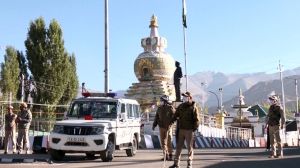Out of fission
Prime Minister Manmohan Singh’s remarks that India’s plans to separate its civilian and military nuclear facilities are in an adva...

Prime Minister Manmohan Singh’s remarks that India’s plans to separate its civilian and military nuclear facilities are in an advanced stage offer the reassurance that the negotiations with the US on implementing the historic nuclear pact are on track. The longer India lingers on its separation plan, the more likely it is the deal would just drift beyond the grasp of the two nations. Having come this far it would be a pity to squander the deal, which promises to lift the decades-old nuclear blockade against India and transform Indo-US relations. President Bush’s visit to India in late February or early March next year offers the forcing event to compel bureaucracies in both the capitals to get their nuclear act together.
Nearly five and a half months after the pact was signed, sections of the Indian establishment have been dragging their feet on implementing Delhi’s part of the nuclear bargain. Under the pact, signed by Bush and Singh in July, the US would resume full civilian nuclear energy cooperation with India in return for Delhi identifying its civilian nuclear facilities and putting them under international safeguards. A whole range of arguments, some genuine and others spurious, have been offered in the public domain to delay the separation plan and quietly kill the nuclear deal. Cutting through the jargon that nuclear specialists have been bandying about, there is just one question that needs to be answered in freezing the parameters of the separation plan. Would India have enough plutonium for a credible, minimum nuclear arsenal in the coming decades?
Once the political leadership makes a judgement on this question, the rest is minor technical detail. Foreign Secretary Shyam Saran is expected to offer India’s separation plan next week to senior officials in Washington. If they like the plan, the Bush Administration will introduce the draft legislation in the US Congress to change the domestic non-proliferation law. It will also consult with the Nuclear Suppliers Group to modify the international nuclear rules in favour of India. Given the short timelines that are staring at Delhi and Washington, one hopes the government is giving Saran a plan that is not only serious in its intent but would also be seen as such by our US interlocutors. A substantive separation plan would avoid further haggling on separation between Delhi and Washington and let them focus on winning support in the US Congress and the NSG for the Indo-US nuclear pact well before Bush begins to pack his bags for India.



- 01
- 02
- 03
- 04
- 05




























